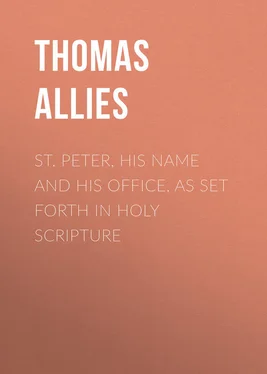Thomas Allies - St. Peter, His Name and His Office, as Set Forth in Holy Scripture
Здесь есть возможность читать онлайн «Thomas Allies - St. Peter, His Name and His Office, as Set Forth in Holy Scripture» — ознакомительный отрывок электронной книги совершенно бесплатно, а после прочтения отрывка купить полную версию. В некоторых случаях можно слушать аудио, скачать через торрент в формате fb2 и присутствует краткое содержание. Жанр: foreign_antique, foreign_prose, на английском языке. Описание произведения, (предисловие) а так же отзывы посетителей доступны на портале библиотеки ЛибКат.
- Название:St. Peter, His Name and His Office, as Set Forth in Holy Scripture
- Автор:
- Жанр:
- Год:неизвестен
- ISBN:нет данных
- Рейтинг книги:3 / 5. Голосов: 1
-
Избранное:Добавить в избранное
- Отзывы:
-
Ваша оценка:
- 60
- 1
- 2
- 3
- 4
- 5
St. Peter, His Name and His Office, as Set Forth in Holy Scripture: краткое содержание, описание и аннотация
Предлагаем к чтению аннотацию, описание, краткое содержание или предисловие (зависит от того, что написал сам автор книги «St. Peter, His Name and His Office, as Set Forth in Holy Scripture»). Если вы не нашли необходимую информацию о книге — напишите в комментариях, мы постараемся отыскать её.
St. Peter, His Name and His Office, as Set Forth in Holy Scripture — читать онлайн ознакомительный отрывок
Ниже представлен текст книги, разбитый по страницам. Система сохранения места последней прочитанной страницы, позволяет с удобством читать онлайн бесплатно книгу «St. Peter, His Name and His Office, as Set Forth in Holy Scripture», без необходимости каждый раз заново искать на чём Вы остановились. Поставьте закладку, и сможете в любой момент перейти на страницу, на которой закончили чтение.
Интервал:
Закладка:
III. All who have received the ministry of the word, and the charge of defending the faith and preserving unity, and are "ambassadors in Christ's name," have a claim to be listened to, but he above all who holds the chiefship of faith, and who received the charge, "Confirm thy brethren." He therefore must be the supreme standard of faith, which is just what S. Peter Chrysologus, in the fifth century, wrote to Eutyches: "We exhort you in all things, honourable brother, to pay obedience to what is written by the most blessed Pope of the Roman city; for S. Peter, who both lives and rules in his own see, grants to those who ask for it the truth of faith." 129 129 Twenty-fifth letter among those of St. Leo.
IV. And in this prerogative of Peter, to be heard above all others, we find the meaning of certain ancient expressions. Thus 130 130 Con. Symmachum, Lib. 2, v. 1.
Prudentius calls him, "the first disciple of God;" 131 131 Sermon 76.
S. Augustine, "the figure of the Church;" 132 132 Hom. 88, on John.
S. Chrysostome, "the mouthpiece of the disciples, and teacher of the world;" 133 133 Encom. in Petrum et cœteros Apostolos.
S. Ephrem Syrus, "the candle, the tongue of the disciples, and the voice of preachers;" 134 134 Cat. xi. n. 3. [Greek: ho prôtosthatês tôn Apostholôn kai tês ekklêshias koryphaios khêryx.]
S. Cyril of Jerusalem, "the prince of the Apostles, and the highest preacher of the truth." In these and such like continually recurring expressions we recognise his chiefship in the episcopate of faith, his being the standard of faith, and his representing the Catholic faith, as the branches are gathered up in the root, and the streamlets in the fountain.
V. Our 135 135 Mark xvi. 16; John iii. 18; Rom. iii. 3, &c.
Lord has most solemnly declared, and S. Paul repeated, that no one shall be saved without maintaining the true and uncorrupt faith. Of this Peter's faith is the standard and exemplar. Accordingly by the law of Christ unity with the faith of Peter is necessary to salvation. This law our Lord set forth in the words, "Confirm thy brethren." And to this the Fathers in their expressions above quoted allude.
VI. The true faith and the true Church are so indivisibly united, that they cannot even be conceived apart from each other, faith being to the Church as light to the sun. But the true faith neither is, nor can be, other than that which Peter, "the first disciple of God," "the teacher of the world," "the mouthpiece of the disciples," and "the confirmer of his brethren," holds and proposes to others. No communion, therefore, called after Christ, which yet differs from that faith, can claim either the name or dignity of the true Church.
VII. If any knowledge have a special value, it is surely that by which we have a safe and ready test of the true faith and the true Church. It is of the utmost necessity to know and embrace both, and the means of reaching them are proportionably valuable. Now that test abides in Peter, by keeping which before us we can neither miss the true faith nor the true Church. For no other true faith can there be than that which he delivers, who received the charge of confirming his brethren, nor other true Church than what Christ built, and is building still. Hence the expression of S. Ambrose, 136 136 Ambros. in Ps. 1. n. 30.
"where Peter is, there is the Church;" and of Stephen 137 137 Mansi, Tom. viii. 746.
of Larissa, to Pope Boniface II. (a. d. 530.) "that all the churches of the world rest in the confession of Peter."
VIII. With all these agrees that famous and most early testimony of S. Cyprian, 138 138 De unitate Ecclesiæ, 3.
that men "fall away from the Church into heresy and schism so long as there is no regard to the source of truth, no looking to the head , nor keeping to the doctrine of our heavenly Master. If any one consider and weigh this, he will not need length of comment or argument. It is easy to offer proofs to a faithful mind, because in that case the truth may be quickly stated." And then he quotes our Lord's words to Peter, Matt. xvi. 16, and John xxi. 17, adding, "upon him being one He builds His Church." Therefore that Church can neither be torn from the one on whom she is built, nor profess any other faith, save what that one, who is Peter, proposes.
CHAPTER III.
THE INVESTITURE OF PETER
Our Lord has hitherto, while on earth, 139 139 Passaglia, p. 93.
ruled as its visible head that body of disciples which He had chosen out of the world, and which His Father had given Him. And this body He for the first time called the Church in that famous prophecy 140 140 Matt. xvi. 16.
wherein He named the person, who, by virtue of an intimate association with Himself, the Rock, should be its foundation, and the duration of which until the consummation of the world, He pronounced at the same time, in spite of all the rage of "spiritual wickedness in high places" against it, because it should be founded upon the rock which He should lay.
Secondly, He had, at that period of His ministry when He thought it meet, the second year, selected out of the rest of His disciples, after ascending into a mountain and continuing the night long in prayer, twelve whom He named Apostles – as before and above all sent by Him – for "He called whom He would Himself, and they came to Him," to whom "He gave authority over unclean spirits, to cast them out, and to heal every disease and every weakness," whom He chose also "to be with Him," His personal attendants, "and to send them to preach;" to whom, moreover, He subsequently made a promise that whatever they should bind on earth, should be bound in heaven, and whatever they should loose on earth should be loosed in heaven. 141 141 Matt. x. 1; Mark iii. 13-15; Luke vi. 12-13; Matt. xviii, 18.
Thirdly, as at a certain time in His ministry, that is the second year, He had selected twelve to be nearer His person than the rest of His disciples, so at a yet later time, the third year of His ministry, He had set apart one out of the twelve, to whom from the very first, and before either he, or any one, had been called to be an Apostle, or even, as it would seem, a disciple, He had given a prophetic name; whom by word and deed, in correspondence with that name, He designated to be the future Rock of His Church, to be the Bearer of the keys, which opened or shut the entrance to His mystical Holy City, to be endued with power singly to bind and to loose; and whom at last, on the very eve of His being taken away from His disciples, He pointed out as the future "First one," "Greater one," or "Ruler," among them, having, as such, had given to him a special and singular charge, after the departure of the Head, to "confirm his brethren."
It is manifest that this was all which, before His offering Himself up for the sin of the world, and the withdrawal of His visible presence thereupon ensuing, He could do for the government of His Church. For as long as He was there, the Son of Man among men, seen, felt, touched, and handled, the sacred voice in their ears, and the divine eyes gazing bodily upon them, He was not only the fountain of all headship and rule, but He exercised in His own person the highest functions of that headship and visible rule. He daily encouraged, warned, corrected, taught, united them; in short, to use His own words, "while He was with them, He kept them in His Father's name." 142 142 John xvii. 12.
But now another time, and other dangers were approaching. The sword was drawn which should "strike the shepherd," there was a fear that "the sheep would be scattered," not only for a moment, but for ever. To meet this the care of the divine guardian was necessary in a further disposition of those powers which He received at His resurrection from the dead. For henceforth His visits, as of a risen King, were to be few and sudden, when He pleased, and at times they expected not, "for forty days appearing to them and speaking of the kingdom of God," and as soon as His final injunctions had been thus royally given, "the heavens were to receive Him till the time of the restoration of all things." The Apostles could no longer "be with Him," as before, nor He "keep them," as in the days of His flesh.
Читать дальшеИнтервал:
Закладка:
Похожие книги на «St. Peter, His Name and His Office, as Set Forth in Holy Scripture»
Представляем Вашему вниманию похожие книги на «St. Peter, His Name and His Office, as Set Forth in Holy Scripture» списком для выбора. Мы отобрали схожую по названию и смыслу литературу в надежде предоставить читателям больше вариантов отыскать новые, интересные, ещё непрочитанные произведения.
Обсуждение, отзывы о книге «St. Peter, His Name and His Office, as Set Forth in Holy Scripture» и просто собственные мнения читателей. Оставьте ваши комментарии, напишите, что Вы думаете о произведении, его смысле или главных героях. Укажите что конкретно понравилось, а что нет, и почему Вы так считаете.












